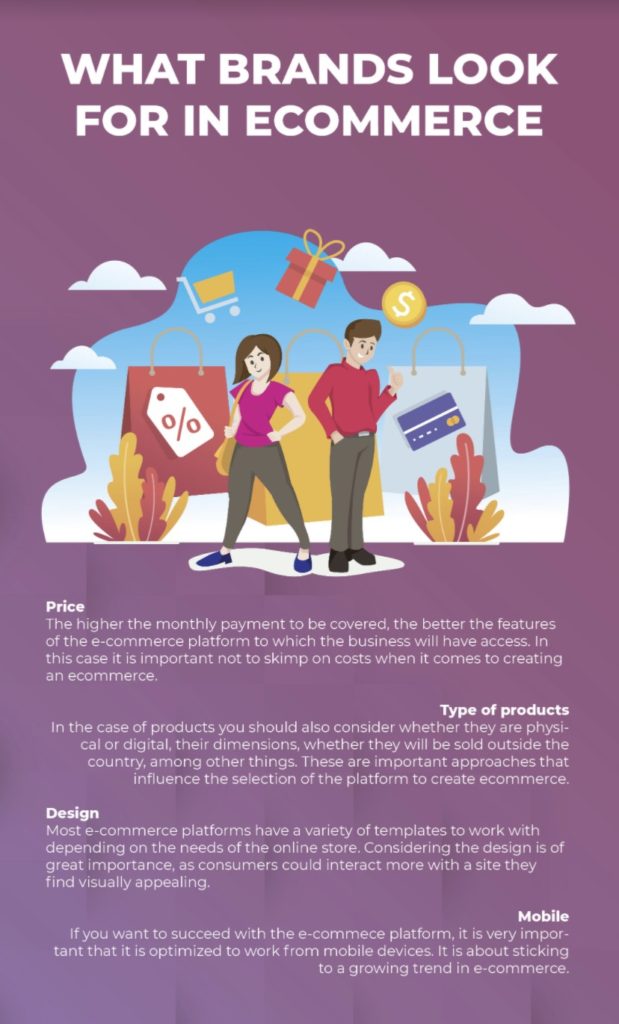The last 10 years have seen a steady growth in eCommerce. Online sales boosted up nearly 15% last year, and the number is expected to go up in the near future. If you’re starting a business and selling products or offering services, it’s essential you get yourself an eCommerce site so you can capitalize on this digital sales growth.

There’s always the option of hiring a web developer to create your site, but the costs for someone who’s just starting out may be too much. Luckily, there are now eCommerce platforms that even the non-tech savvy can navigate with ease.
But with the many options available, how can you possibly end up getting the right one? Let’s discuss what you need to consider when choosing the right eCommerce platform to get your business started.
SEO Friendliness
Yes, even eCommerce businesses need to improve their SEO. In fact, it can be highly beneficial if your store ranks high in search results. You have to remember that your customers and potential ones have to find you easily when they are searching for products your store specifically offers or similar types.
Below are the important factors in looking for a platform that’s SEO friendly:
- Customers should be able to leave reviews
- You should have the option to use your own domain name
- You should be able to add a blog to your store
Integrations
Your choice of eCommerce platform should come with the right plugins and integrations. Platforms like Shopify and Big Commerce will have plenty of tools to effectively manage your business. The needs of your business should help you decide on the plugins that work best for your business, so when choosing a platform, take note of all the tools you already use and what more you need.
Check out some of these plugins that are common in eCommerce sites.
- Shipping apps
- Reward plugins to give your customers some deals and bonuses for using your products or services
- Email marketing tools
- Accounting plugins to help with profits, revenue, taxes, and sales
Payment and Pricing
Knowing the price of an eCommerce platform is also necessary. After all, not all businesses actually have the capital to work on, so if you can save a ton of money, then do so without compromising the quality of your site.
What’s common in all platforms is that fees come in monthly. Whether you get a hosted or a self-hosted platform, expect varying costs overall. For example, Big Commerce pricing will be entirely different from Shopify pricing, so when you’re moving your business online, know the pros and cons of each to get the most out of your budget.
Know the options of customer payment as well. You don’t want to end up having an annoyed and frustrated customer because of the lacking payment method on your site. Your customers will end up abandoning their carts if they don’t find anything convenient to pay with.
Customer Service
Business owners know all too well that the key to a successful business is excellent customer service. Brick-and-mortar stores handle it very differently. Typically, they have more control over how smooth the business is running.
eCommerce sites are a whole different thing. There could be downtimes and server outages out of your control, which will prevent your customers from buying anything or accessing your site, affecting both your image and your revenue.
It’s important to be able to reach a person who can help you in these instances. Check out how viable a platform’s customer services are and how much each service costs. Are they available 24/7? Be sure to have information about this before you decide on a platform.
Mobile Friendliness
A fact that you have to consider these days is that most searches come from mobile devices, and those searches often end up in purchases. This means that you have to consider the mobile-friendliness of your site so that your customers can easily access it no matter where they are.
Design your site in a way that all the content will fit into one tiny screen. Make sure the images are clear, the texts are big enough to see, and the layout is easy to navigate.
Security
Last but not the least, provide customers the guarantee that browsing on your site is safe and secure. After all, no one wants to enter their credit card details on a sketchy looking site. There are many software these days that offer strong security as standard, but make sure your platform supports HTTPS/SSL to provide customers with secure and safe checkout. Additionally, your platform should comply with the standards set by the Payment Card Industry (PCI).
Figuring out the ins and outs of eCommerce as you grow will always be a challenge, but it’s well worth it in the end to design a process that works for your business. By knowing what to look for ahead of time, the platform you choose will eventually lead you to success.




3 comments
… [Trackback]
[…] Find More Info here to that Topic: thelibertarianrepublic.com/considerations-when-choosing-an-ecommerce-platform/ […]
… [Trackback]
[…] Read More Information here on that Topic: thelibertarianrepublic.com/considerations-when-choosing-an-ecommerce-platform/ […]
… [Trackback]
[…] Find More here on that Topic: thelibertarianrepublic.com/considerations-when-choosing-an-ecommerce-platform/ […]